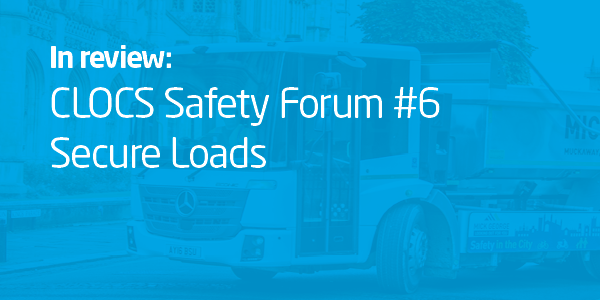
Thank you to everyone who got involved in the recent CLOCS Safety Forum #6 which took place on 17th June 2021 tackling the subject of Secure Loads. We were joined by our Champion speakers Mark Mortell from ISG and Mark Olden from Murphy Plant who shared their experiences and learnings with the group.
Andy Brooke from CLOCS, Ruth Trant from Alandale and Keith Walshe from Derwent helped in the breakout rooms as chairs where the task was to develop the basis for a checklist/toolbox talk for the stakeholders involved in loading and unloading.
The groups agreed that any checklist should consider the following:
- Roles and responsibilities for all parties
- Communications to ensure all parties understand site and load arrangements
- Appropriate actions to be taken
- Consideration of access/egress points, ground conditions and other relevant site conditions
- Gate check processes, i.e. vehicle/driver checks
CLOCS also discussed the issue at the last Working Group meeting in order to develop and create a useful resource (TBC) for Champions and the sector.
Summary of forum discussions
- It seems clear and understood that there are 2 clear parties with responsibilities – contractor (site team) and fleet operator (driver) – and it needs to be clear who does what. This may not be the same every time but there should be established good practice which is the understood default position.
- This should then be documented and communicated so that any disagreements or discrepancies can be discussed. Additionally, the supply chain should be educated and understand roles and responsibilities.
- Sites should send operators their loading/unloading procedures prior to delivery and operators should do the same, send sites their loading/unloading procedures.
- It was suggested that operators should be the experts when it comes to loading and unloading so perhaps they should take the lead by default.
- It is vital for all concerned to embed a culture of challenging perceived poor behaviour – it should be encouraged and rewarded.
- Is there any formal training or measure of competence out there for delivery drivers, slingers, etc.?
- Drivers usually receive a brief induction when arriving at site but it is felt that there is little time to properly engage with instances of 70+ deliveries a day. Pressures exist to get vehicles in and out quickly.
- Vehicles should be escorted and someone on site would ideally have responsibility for keeping an eye on the vehicle the whole time it is on site, from arrival to departure.
- Pre-slung loads were discussed and positioned as a good thing though some seemed to disagree.
- Unloading zones should be clearly marked and access restricted, perhaps using coloured PPE to identify who can enter and who cannot.
- Could a visual check of a load be part of the gate check – not giving the site any responsibility but a quick check before the vehicle enters the site? Likewise, could they do the same on departure?
- What if the driver asks a site operative for help – should they be explicitly told not to assist with deliveries/unloading in any way unless it is one of their agreed responsivities or a site manager has given express permission?
If you’d like to help shape this checklist, please get in touch at support@clocs.org.uk.
Join us again when we return after the July/Aug Summer break for CLOCS Safety Forum #7 – 16th Sep 2021 – topic TBC.


